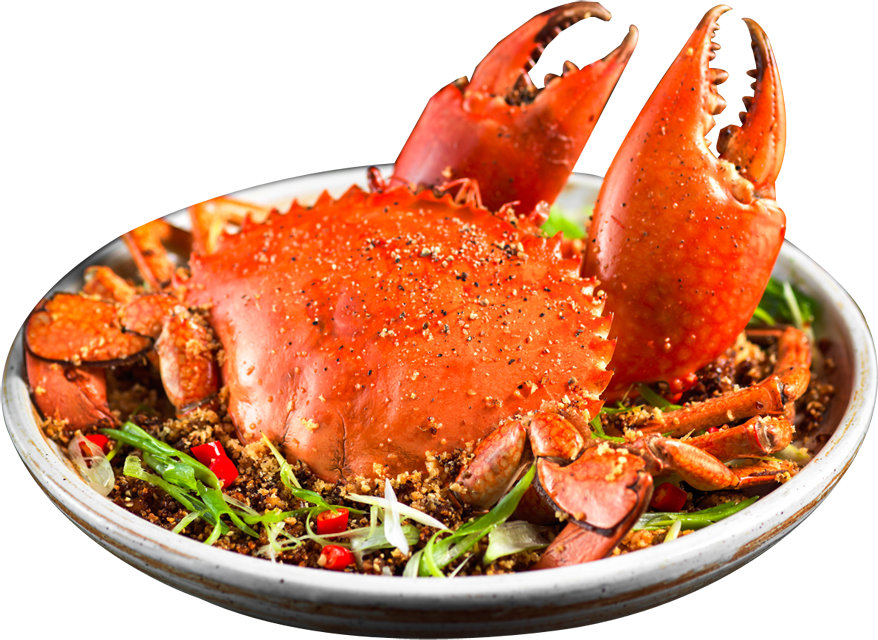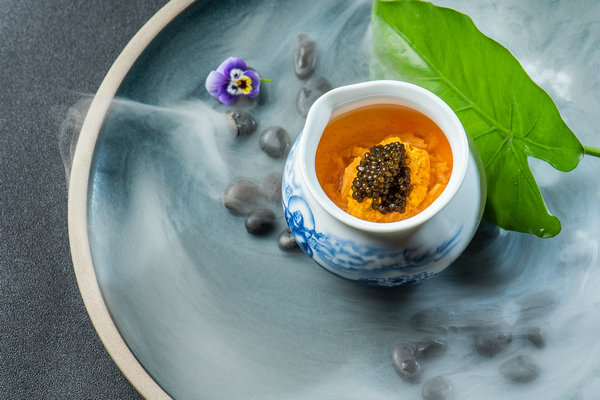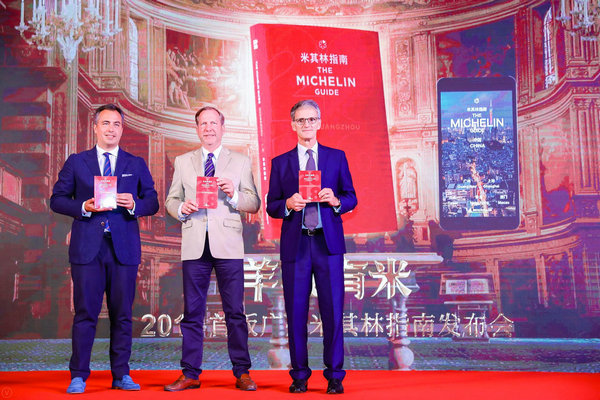Chef team of Jade River. [Photo/China Daily]
China's southern city of Guangzhou was on June 28 placed on the global gastronomy map with the unveiling of the first edition of its own Michelin guide.
Guangzhou is the 32nd destination in the world to make it into the Michelin guide and is the second city in the Chinese mainland to be featured after Shanghai.
"Its focus on the inheritance and innovation of culinary techniques has brought excellence and creativity to its food and beverage sector," said Michael Ellis, the international director for the Michelin guide. "This is one of the fundamental reasons why we decided to bring the Michelin guide here."
The Guangzhou guide also marked the introduction of two special awards to pay tribute to the diversity of the cuisine in Guangzhou.
Jian Ji won the "Respectable Recipe Award" for their e-fu noodles which have been made using traditional methods for more than 50 years. Ze 8 received the "Revitalized Cuisine Award" for their efforts in modernizing traditional Cantonese claypot dishes.
Steamed crab custard, crab meat, and caviar with Chinese rice wine from Lai Heen. [Photo/China Daily]
Just like what happened in Shanghai when the city's guide was first unveiled in 2016, the Guangzhou edition has sparked a flurry of debates among foodies, with some championing the rating system and others expressing doubt that Michelin inspectors can appreciate diversified and sophisticated Chinese cuisines.
In the inaugural Guangzhou guide, only eight restaurants were awarded with a star. There were no two- or three-star recipients. Twenty restaurants were awarded with the Bib Gourmand while 35 were given Michelin Plates.
Many foodies expressed disappointment that Guangzhou, a city with a reputation for being a gastronomy paradise, had no restaurants that received more than one Michelin star. In contrast, eight restaurants in Shanghai were awarded two or three stars in the city's first guide.
Ellis attempted to defray tensions by saying that there are other cities in the world where none of the restaurants featured in the inaugural guide are awarded with two or three stars.
Annoyed foodies have taken to the internet to claim that the city does not need a Michelin guide. "Everyone here has his or her own list of favorite restaurants. Because of this, many locals find the Michelin guide unnecessary," says Wallace Wang, a local foodie.
Poached sunflower chicken from Lai Heen. [Photo/China Daily]
Wang also suggests the Michelin inspectors might have missed out on eateries that many feel should have made it to the guide because of their lack of local knowledge.
"Many good eateries are tucked within older neighborhoods and in the suburban areas. A foreign company may not have such in-depth knowledge of Guangzhou," he says.
"Only a few restaurants on the star list like Bing Sheng and Wisca are indeed popular with locals," he adds.
Chinese food blogger Panpanmao, however, views the situation in a different light.
"Why do locals need to be so fussy about the Michelin guide? The guide is for tourists and foreigners to know more about Guangzhou," wrote Panpanmao, who has about a million followers on her Sina Weibo account.
First-ever Michelin guide of Guangzhou was released on June 28, and Michael Ellis, the international director for the Michelin guide (in the middle).[Photo/China Daily]
"The Michelin is the most recognizable award for a restaurant. Almost all diners know what the guide is about."
Tan Guohui, the chef of Yun Pavillion at Conrad Guangzhou, echoes this sentiment.
"Guangzhou is now one of the 32 cities worldwide that has a Michelin guide. Isn't that a good promotion of the city and Cantonese cuisine?" he says.
Yun Pavillion is among the 35 restaurants in Guangzhou awarded with the Michelin Plate, which according to the guide means that "customers can enjoy a carefully prepared meal with fresh ingredients".
Maxime Lu, a food and wine critic from Beijing, says: "Disagreements occur whenever the Michelin guide arrives in a new city. It was the same with Shanghai. But at the end of the day, it is still the most renowned and powerful dining guide on a global level."

Lu also says the guide's anonymous reviewing process is something diners should appreciate.
"The Michelin inspectors are anonymous, and they pay their bills as common diners without revealing the identity to the restaurant. That is a crucial element for making a fair review," he says.
According to Ellis, Michelin inspectors adhere to a strict judging criterion that includes "product quality, preparation and flavors, the chef's personality as revealed through his or her cuisine, value for money, and consistency over time and across the entire menu".
The director adds that the team who reviewed dining establishments in Guangzhou comprises a mix of local and international inspectors.




















